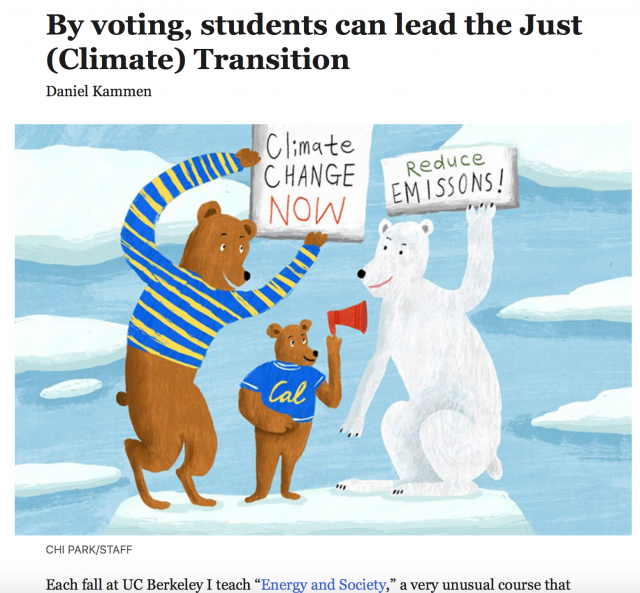NEWS Students can lead the (Just) Transition on Climate -
From The Daily Californian, Tuesday, October 8. Click here to go direct to that link, or here for the BerkeleyBlog version.
Voting for a Just Transition
Daniel M Kammen
Each fall at UC Berkeley I teach ‘Energy and Society’, a very unusual course that covers the science, politics, and policy angles needed to understand – and to change – our energy system from one that is now rapidly degrading the planet, to a sustainable, healthy, and equitable one. The best feature of this class is that it is a melting pot not only of different majors, but also of undergraduate and graduate students working together to master the material
The first thing we cover, using basic chemistry that has been well known to science for over 100 years,is that endlessly emitting greenhouse gases will warm the planet. We have known scientifically since the 1990s that climate change is already impacting ecosystems, crops, and both human and environmental health. We have known for almost two decades that we have already warmed the planet by one degree Celsius, and that at two degrees Celsius, dramatic changes to the earth will be everyday events.
Instead of becoming a rallying cry for innovation as were the responses to disease (“the war on polio”), food, poverty and nutrition (“the Green Revolution”) or the desire to reach space (“the Apollo program”), climate change has become, arguably, the most divisive issue in the United States. Where we used to see challenge as an opportunity, this one, inexplicably has become a proxy-war for economic insecurity and class division.
After all, the U.S. Environmental Protection Agency, launched under Republican President Nixon and passed through House and Senate Committees in 1970. TheClean Air Actbecame law in 1970, where it passed the Senate without a single ‘no’ vote. Only one representative voted against the bill. Against expectations, George H. W. Bush featured the environment prominently in his campaign, and in 1988 his presidency saw an expansive update to the Clean Air Act which the Senate passed with bipartisan support.
Since then, however, things have deteriorated, with attention and investment in environmental quality at local, to national, and at global levels becoming the ‘third rail’ of U.S. politics.
This is where local action by Cal students is so critical. As the acknowledged top public university in the world, Cal students, staff, faculty and alumni have helped to make California the remarkable energy and climate leader that it is, but have also found a myriad of ways to spread those experiences across the country and around the world. That reach has never been more important than now as we approach the most important mid-term election in decades.
At the Climate Action Global Summitin San Francisco last month I heard an approach that harkened back to the bipartisanfounding of the U.S. EPA.. This new vision was stated most clearly and eloquently not by politicians, orators, or scientists, but by high-school and college students who gathered in a series of youth summits organized within and around the official meetings.
What is most ironic is that climate change is actually one of the most interesting issues and opportunities we as a country have ever faced because its solution creates economic opportunities. Every bit of coal, gas, or oil that we replace with energy efficiency and clean energy is a shift away from mining resources to investing in companies and investing in people. After all, when the fuel is free, creating new technologies and building social institutions and policies are all ways to invest in ourselves and to both create employment and to use data and institutions to grow the economy. My laboratory here at UC Berkeley has been researching and documenting the green jobs ‘dividend’ and has been doing work witha series of students, many of whom are alumni of ‘Energy and Society’.
The clean energy opportunity is aligned with core values – at least those stated on paper – by both the Democratic and Republican parties. Instead of one of the few places for bipartisan action, however, it has become an area where even the most basic facts are endlessly debated. As research launched at Berkeley has shown, investments in mass transit and for those who need cars, electric vehicles are not only cheaper to operate than gas-powered cars, but they also lead to dramatic reductions in urban air pollution, a hallmark of California policies since the 1970s.
As inequality has grown across America, UC-based research has continued to highlight the many examples of well-meaning policies (such as subsidizing electric vehicles for the affluent) that exacerbate the growing national economic divide. Instead, efforts launched here to invest in more affordable homes and apartments by integrating energy efficiency, solar, power, and both better mass-transit and electric vehicles for low-income Californians offers a sustainable path to social equity.
Of particular note is that California’s landmark climate legislation, SB32which governs our state decarbonization from 2020 – 2030, calls for 35% or more, of our greenhouse gas cap and trade revenues (now in the $10 billion/year range) to be spent on underserved minority communities. I’ll wager that when we look back this bill, it will be this investment in social justice, not the climate target that will be its most important legacy.
This is where the Cal students can play a most immediate and hugely impactful nationwide role: by reaching out to fellow students, parents, and friends both across California and across the country to highlight how doubling down on equitableclean energy projects offers a rare and genuine ‘win-win’ at a time when the country is more divided than ever.
Daniel Kammen is professor and chair of the Energy and Resources Group, and Professor in the Goldman School of Public Policy, and in the Department of Nuclear Engineering. He served in the Obama Administration as Science Envoy for the State Department.
Twitter: @dan_kammen

You must be logged in to post a comment.